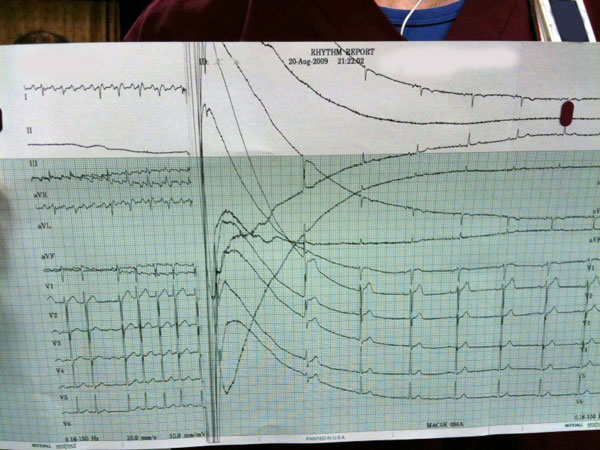July 24th, 2011 by John Mandrola, M.D. in Opinion, Research
No Comments »

I recently came across a very important blog post on the use of the novel new blood-thinner, dabigatran (Pradaxa).
Fellow Kentucky cardiologist, and frequent TheHeart.org contributor, Dr. Melissa Walton-Shirley wrote this very detailed case presentation involving a cantankerous non-compliant rural patient with AF (atrial fibrillation) that sustained a stroke while “taking” dabigatran.
Dr. Walton-Shirley details the very commonly done procedure of cardioversion (shock) for AF. As she clearly points out, the most important safety feature of shocking AF back to regular rhythm entails adequate blood thinning before and after the procedure. Thin blood prevents the possibility of clots dislodging after restoring normal contraction to the top chambers of the heart (atria).
Herein lies the rub with dabigatran, and the two soon-to-be-approved non-warfarin blood-thinning agents, apixaban and rivaroxaban. In the past, Read more »
*This blog post was originally published at Dr John M*
October 9th, 2010 by John Mandrola, M.D. in Better Health Network, Health Tips, Opinion, True Stories
No Comments »

It’s been a very busy few weeks. Medicine is like that — seldom is “business” steady. Like rainy weeks in the southeast when you think it will never be sunny again, there are weeks when you think everyone’s atria are fibrillating. So there were shocks, and burns, and wires installed. The heart rhythm was rocking, and so were we.
But in all this fury two cases stand out as a reminder that in spite of, not always because of, what we doctors do, the human body can right itself — like it did before their were drugs, procedures, and surgery. (Keep this quiet, though.)
Case 1: A semi-emergent consultation for atrial flutter (AF’s crazy sister) came in. “Something has to be done, Dr. M,” was the message. She was symptomatic and scared (not necessarily in that order), but after a bit of simple doctoring (a pill), the heart rate had slowed and the symptoms abated somewhat. Then after a heavy dose of an AF doctor’s greatest weapon, reassurance and education, we mutually decided on one of my secret treatments for acute AF/AFlutter: A deep breath, a chair, a book, and time. Just in case, though, a cardioversion (shock) was set up for the next morning. I knew that since this was a first episode, that given some time the heart may right itself, without any fury.
Bingo. The text message came the next morning: “Cardioversion cancelled. Patient converted to sinus rhythm right after you saw her yesterday.” (Grin.) Read more »
*This blog post was originally published at Dr John M*
June 13th, 2010 by Dr. Val Jones in Health Tips, Opinion, True Stories
1 Comment »
Occam’s razor is a well-known logical principle often applied in medicine. It states that the simplest explanation for a complaint or symptom is usually the correct one. Most of the time, Occam’s razor serves the diagnostician well, but when the actual problem is complex or unexpected, patients can be sent down expensive and even life-threatening diagnostic rabbit holes.
A friend of mine is an 80-pack-a-year smoker. He was complaining of shortness of breath, worsening over a couple of months, and his primary care physician sent him to a pulmonologist. The assumption was that the shortness of breath was related to COPD from his chronic smoking — and that indeed would have been the most likely explanation. Read more »
August 22nd, 2009 by GruntDoc in Better Health Network, True Stories
2 Comments »

Today’s included the therapeutic application of electricity

and a real oddity: an adolescent with a potassium of 1.8 (yes, I repeated it).
Emergency Medicine can be mundane occasionally, but days like today make for a really nice change.
*This blog post was originally published at GruntDoc*













